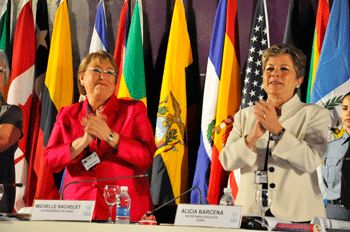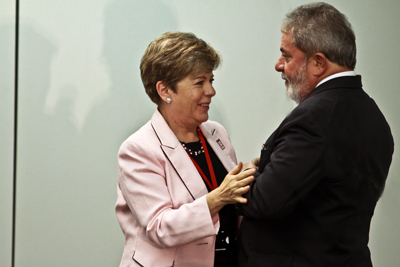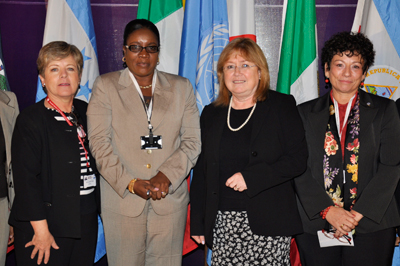Latin America and the Caribbean Countries Approve Action to Achieve Autonomy and Equality for Women
Work area(s)
Support is also expressed for the creation of UN Women and the post-earthquake reconstruction efforts underway in Haiti and Chile.
(Brasilia, 16 July 2010) Delegates from 33 Latin American and Caribbean countries urged the region's Governments to adopt all the social and economic policies necessary to further society's appreciation of the unpaid domestic and care work performed by women and to increase recognition of the economic value of that work.
This recommendation is part of the conclusions and proposals for improving the status of women set out in the Brasilia Consensus, which was adopted today at the closing of the Eleventh Session of the Regional Conference on Women in Latin America and the Caribbean.
Delegates also welcomed the creation of a new entity by the United Nations General Assembly to address gender equality issues and the empowerment of women, called UN Women, and agreed to ask the General Assembly for this entity to be headed by a woman from Latin America and the Caribbean.
Participants expressed their solidarity with the people of Haiti and Chile in the wake of the earthquakes that struck those countries earlier this year and agreed to support post-disaster reconstruction efforts with actions that promote sustainable development, women's rights and gender equality.
The meeting gathered over 700 participants from 13 to 16 July. It was organized by the Economic Commission for Latin America and the Caribbean (ECLAC), with the support of the Secretariat on Policies for Women of Brazil.
The Brasilia Consensus calls for Governments to take action to ensure greater economic autonomy and equality for women in the labour market and urges them to take decisive action to tackle all forms of violence against women by adopting preventive, punitive and protective measures and providing services that help eradicate all kinds of violence against women in both the public and private spheres, and to guarantee women effective access to justice and free legal advice when they are subject to violence.
The Consensus also calls for strengthening the exercise of citizenship by women and expanding their participation in decision-making and in positions of power. It urges Governments to pursue more effective policies that guarantee respect for all women's human rights, as well as the protection and fulfilment of those rights, and to adopt all the measures necessary, including legislative reforms and affirmative policies, to guarantee parity, inclusion, as well as ethnic and racial representation, in all branches of the State, in the aim of strengthening Latin American and the Caribbean democracies.
In addition, the Consensus calls for improving women's access to technologies, credit and assets and promoting egalitarian, democratic and non-discriminatory media, as well as women's integral health and sexual and reproductive rights.
Finally, the participants in the Eleventh Session agreed to organize training, exchange and awareness-raising activities to support public policymaking, based on the data obtained from the Gender Equality Observatory of Latin America and the Caribbean and to promote international, regional, subregional and multilateral cooperation for gender equity.
During the session, ECLAC presented the document What kind of State? What kind of equality?, which examines the progress in gender equality made by Governments in the region as well as the challenges that lie ahead.
In the document, ECLAC proposes a new social covenant to redistribute the total workload between men and women with a view to facilitate women's access to the labour market, which is part of their human rights.
"This document follows up on the proposal set out in Time for equality: closing gaps, opening trails, which we recently presented in Brasilia as well. Brazil opens trails, inspires us with its leadership and sets the course for the region," said Alicia Bárcena, the Executive Secretary of ECLAC.
The proposal takes a comprehensive approach to development focused on equality and which ECLAC put forward as the new roadmap for the countries of Latin America and the Caribbean at the Commission's thirty-third session.
See also:
- Brasilia Consensus
- Resolution adopted at the Eleventh Session of the Regional Conference on Women in Latin America and the Caribbean on the new body, UN Women
- Resolution in support of Chile and Haiti following the earthquakes
Further information on the Eleventh Regional Conference on Women in Latin America and the Caribbean is available on the ECLAC website.
Queries and requests for interviews should be directed in Brazil to: Valderez Caetano, valderez.caetano@cdn.com.br ; tel: (61) 3704-7660, (61) 81177518; Talita Sitta, talita.sitta@cdn.com.br ; tel: (61) 91054870; or Cláudio Tourinho, tourinho@cdn.com.br ; tel: (61) 37047660, (61) 81177313, of CDN Comunicación Corporativa; or the Public Information and Web Services Section of ECLAC, e-mail: dpisantiago@cepal.org ; tel: (56 2) 210 2040/2149.
Related content

Gender Equality Is the Road to Freedom and Democracy
Authorities and delegates from over 30 Latin American and Caribbean countries debate the challenges that need to be overcome in order for women to achieve full autonomy.

"Women Are Better at Channelling the Benefits of Social Programmes"
The President of Brazil received delegates to the Eleventh session of the Regional Conference on Women in Latin America and the Caribbean in Brasilia.

Women Must Be Placed at the Centre of Development for the Rebuilding of Haiti and Chile
Authorities and representatives of the United Nations discussed the challenges outstanding in this area at the Eleventh session of the Regional Conference on Women in Latin America and the Caribbean,…

New Social Covenant Needed to Achieve Equality between Women and Men in the Workplace
Women in Latin America and the Caribbean must conquer economic, physical and political autonomy for full recognition of their rights.
Country(ies)
- Latin America and the Caribbean
-
Haiti
Contact
Public Information Unit
- prensa@cepal.org
- (56 2) 2210 2040
